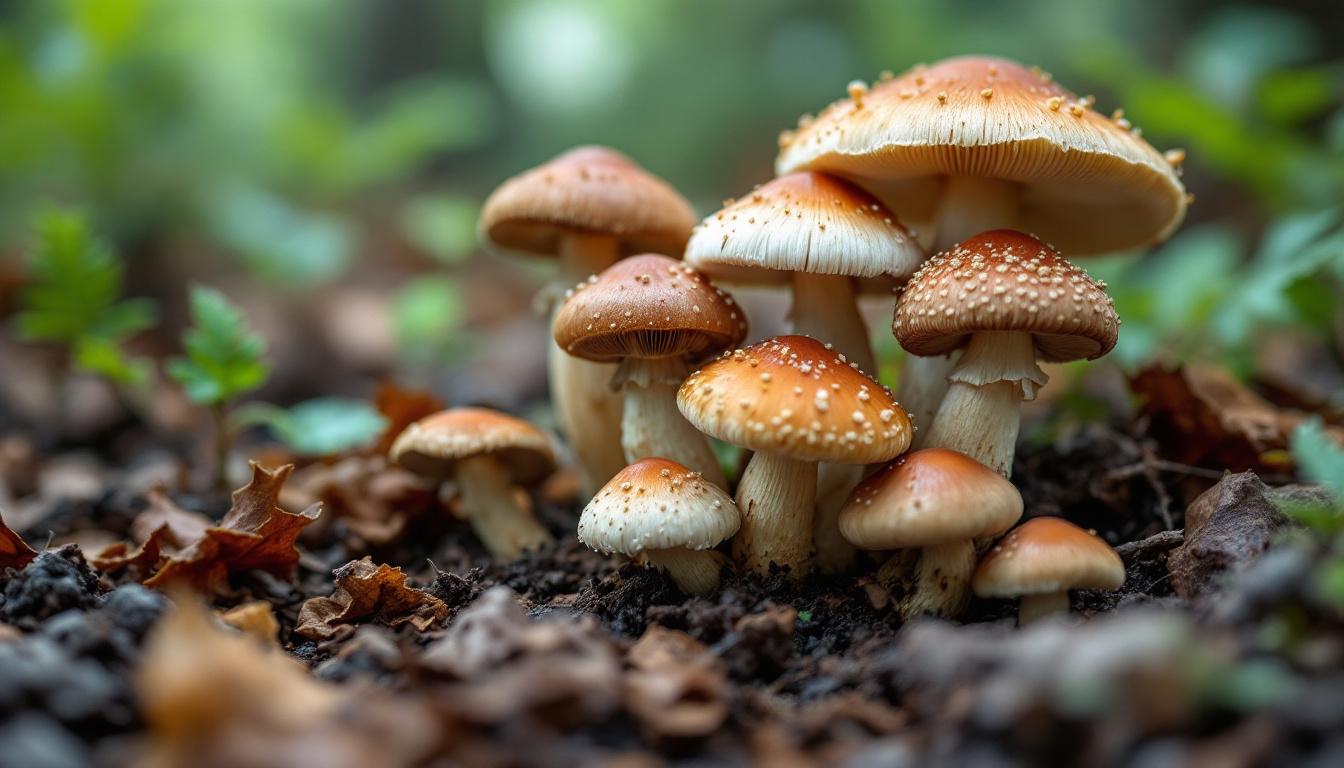At Ultimate Treat, we’re fascinated by the hidden wonders of the fungal kingdom. Mushrooms are not just delicious additions to our plates; they’re environmental powerhouses.
These remarkable organisms are crucial in maintaining ecological balance and offer innovative solutions to environmental challenges. Let’s explore the incredible mushroom environmental benefits that are reshaping our world.
Nature’s Cleanup Crew: How Mushrooms Recycle
The Decomposition Powerhouse
Mushrooms stand as nature’s most efficient recyclers. They break down dead plants, animals, and other organic matter at an astonishing rate. Fungal genera of the phyla Ascomycota, Basidiomycota, and Mucoromycota have demonstrated the ability to degrade various plastic polymer types. This rapid decomposition process maintains healthy ecosystems and prevents the buildup of dead material.
Nutrient Cycling Wizards
As mushrooms break down organic matter, they release essential nutrients into the soil. This process, known as nutrient cycling, is vital for plant growth and ecosystem health. Research shows that AM fungi contribute up to 80% of nutrients in temperate and boreal forests, while the total phosphorus acquired by plants through bacteria and fungi was 75%. Without mushrooms, our forests would struggle to thrive.
Soil Health Boosters
Healthy soil forms the foundation of a thriving ecosystem, and mushrooms play a key role in maintaining soil quality. The mycelia (root-like structures of fungi) create a vast underground network that improves soil structure, increases water retention, and enhances nutrient availability. A study published in Nature found that soils with diverse fungal communities had 50% higher carbon storage capacity than those without.
Practical Applications for Gardeners and Farmers
Home gardeners and farmers can harness the power of mushrooms to cultivate healthier plants and achieve higher yields. Adding mushroom compost to gardens can increase soil fertility and improve plant growth. Many gardeners report up to 30% increase in crop yields when using mushroom-enriched compost.
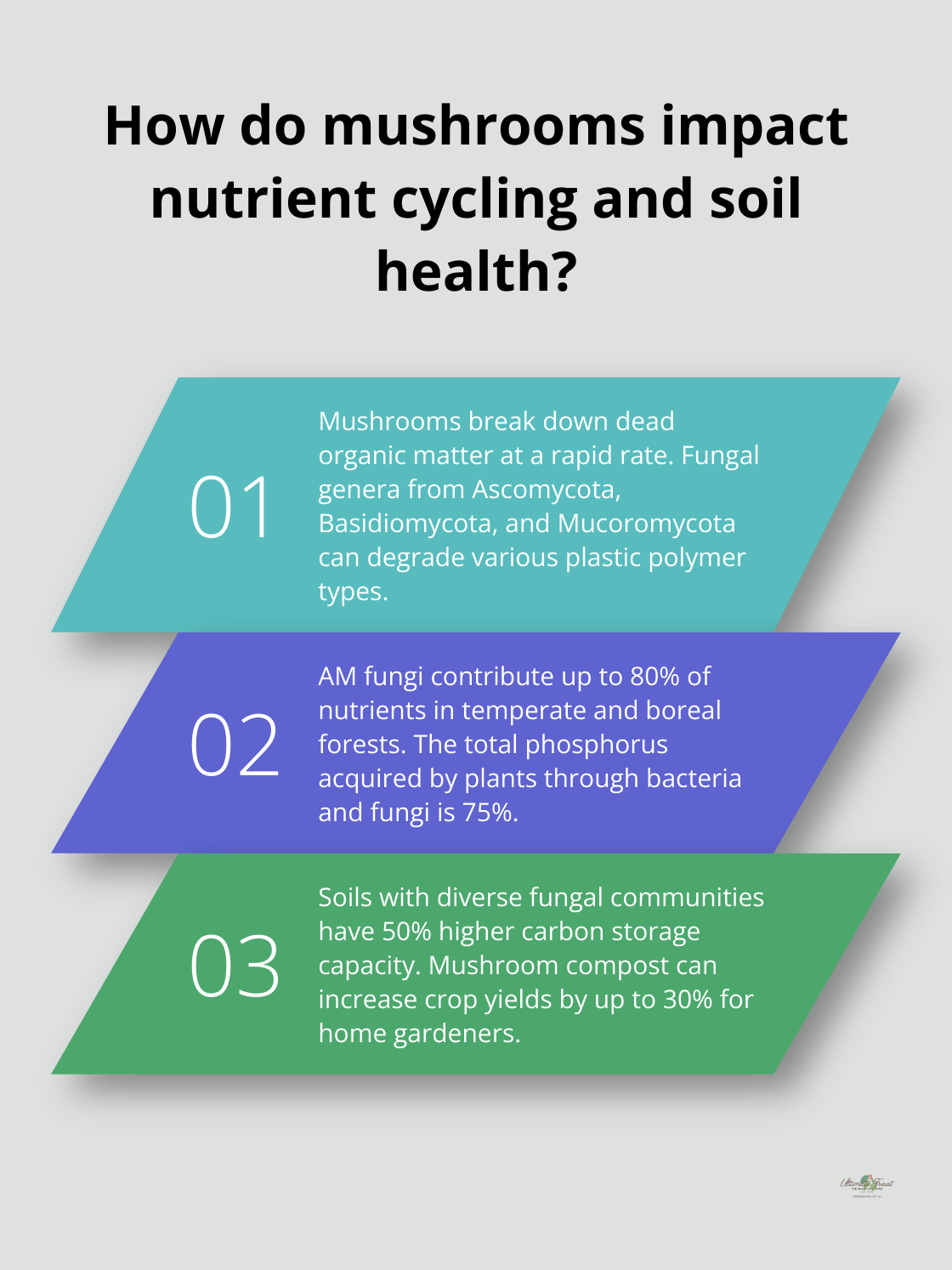
Farmers benefit from incorporating mushrooms into their crop rotation or as companion plants. For example, wine cap mushrooms (Stropharia rugosoannulata) grow well between rows of vegetables, improving soil health while providing an additional harvest.
Innovative Soil Management Techniques
Innovative soil management techniques now incorporate mushrooms to enhance agricultural productivity. Mycoremediation, a process that uses fungi to clean contaminated soils, shows promise in restoring degraded farmlands. Some farmers (particularly in permaculture systems) use “mushroom mulch” – a layer of mushroom-inoculated wood chips—to suppress weeds and enrich the soil simultaneously.
Mushrooms’ remarkable recycling abilities extend beyond the forest floor and garden beds. In the next section, we’ll explore how these fungi tackle environmental pollution and contribute to the cleanup of contaminated sites.
How Mushrooms Clean Up Pollution
At Ultimate Treat, we recognise mushrooms’ extraordinary potential to tackle environmental pollution. These fungi possess remarkable abilities to absorb and break down harmful substances, making them powerful allies in the fight against contamination.
Industrial Waste Cleanup
Certain mushroom species excel at cleaning up industrial pollutants. Oyster mushrooms (Pleurotus ostreatus) have remarkably broken down petroleum hydrocarbons. Research has demonstrated that fungi can degrade recalcitrant contaminants such as petroleum hydrocarbons, particularly the aromatic and phenolic fractions.
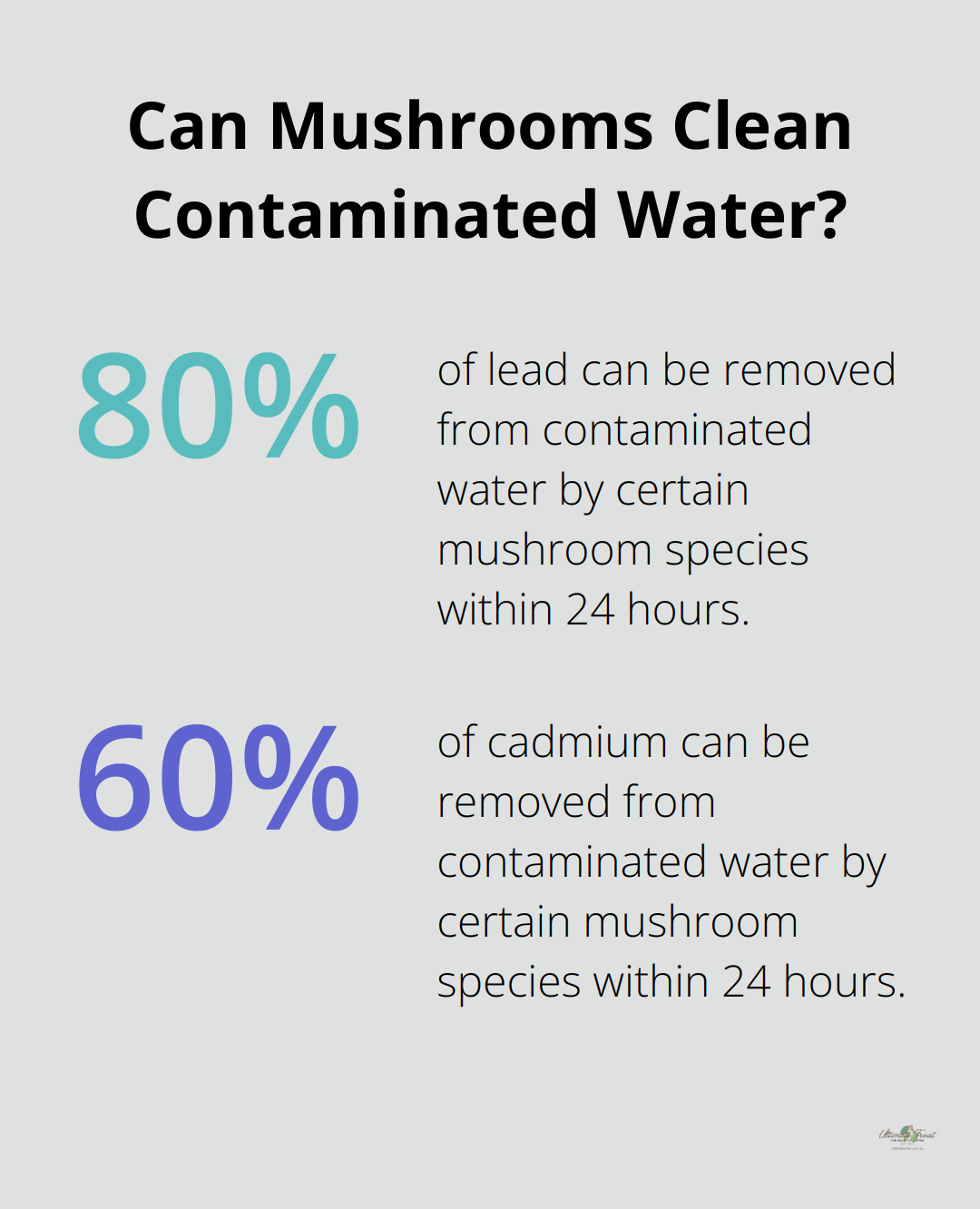
This capability extends beyond oil spills. Mushrooms can tackle other industrial pollutants like pesticides and herbicides. The white rot fungus Phanerochaete chrysosporium can degrade various environmental pollutants. These fungi secrete enzymes that are involved in the degradation process.
Heavy Metal Absorption
Heavy metal contamination threatens ecosystems and human health. Fortunately, many mushroom species act as natural sponges for these toxic elements. The king oyster mushroom (Pleurotus eryngii) has a particular affinity for absorbing lead and cadmium from contaminated soils.
A study published in the Journal of Environmental Management found that certain mushroom species could remove up to 80% of lead and 60% of cadmium from contaminated water within 24 hours. This makes mushrooms a promising tool for cleaning polluted water sources and contaminated agricultural land.
Soil Restoration
Mushrooms don’t just remove pollutants; they help restore life to contaminated soils. As they break down harmful substances, they release enzymes and organic compounds that stimulate microbial activity and improve soil structure.
In a real-world application, Paul Stamets (a renowned mycologist) used oyster mushrooms to remediate a diesel-contaminated site in Washington state. After just four weeks, the soil teemed with life, including plants and insects that had previously been absent.
The potential of mushrooms in environmental cleanup is vast, and we’ve only scratched the surface. As research continues to explore and harness these capabilities, mushrooms may become key players in our efforts to restore polluted environments. Their ability to transform contaminated sites into thriving ecosystems opens up exciting possibilities for sustainable materials and eco-friendly alternatives, which we’ll explore in the next section.
Mushroom Materials Revolutionize Industries
At Ultimate Treat, we witness the innovative ways mushrooms transform various industries. The versatility of fungal materials opens up new possibilities for sustainable packaging, construction, and fashion alternatives.
Eco-Friendly Packaging Solutions
Mushroom-based packaging is emerging as a biodegradable alternative to traditional plastics and Styrofoam. Companies develop materials made from agricultural waste and mycelium. Unlike conventional plastics or Styrofoam, this packaging is fully biodegradable and renewable, decomposing naturally without leaving any harmful residues.
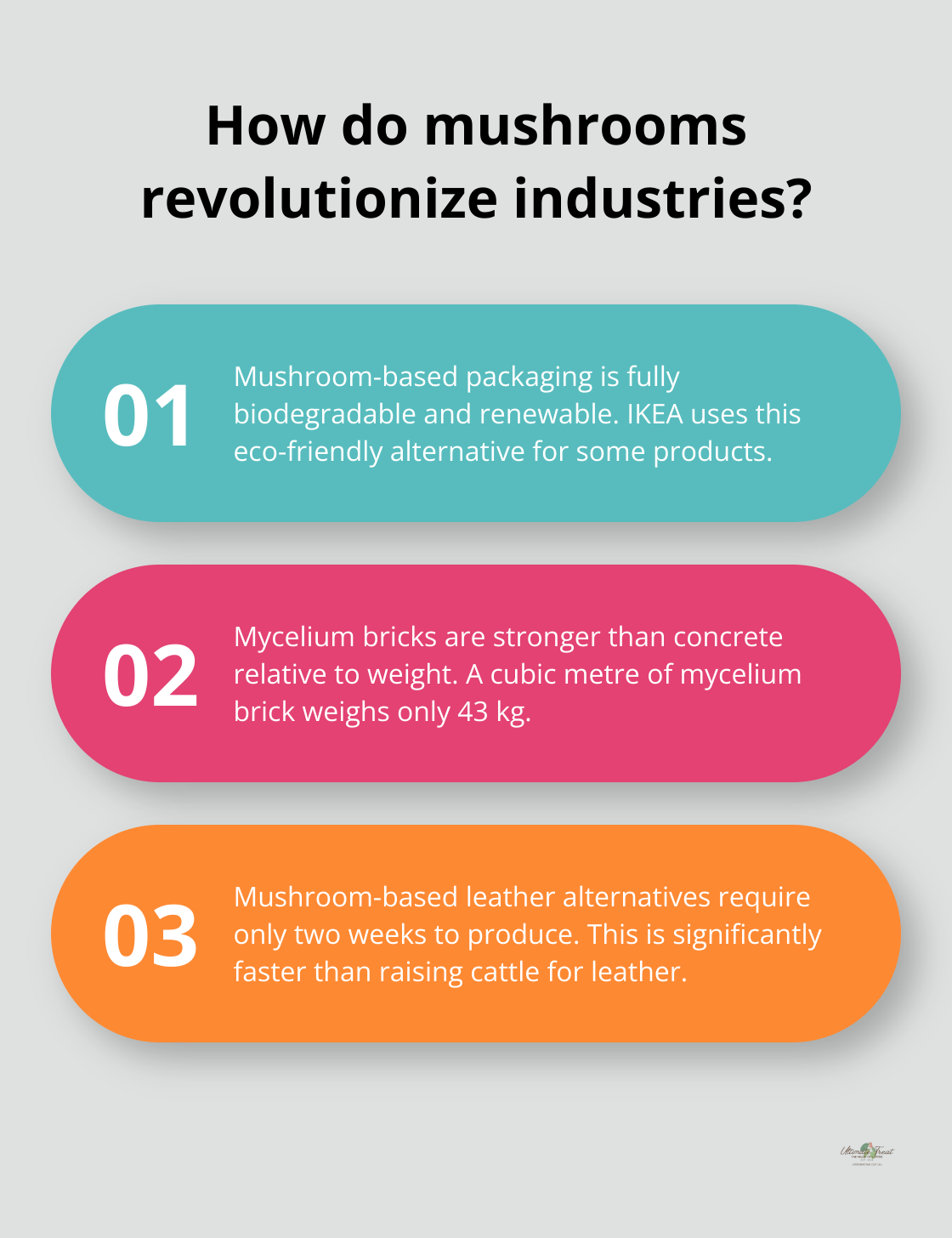
The furniture giant IKEA now uses mushroom-based packaging for some of its products. This shift reduces waste and addresses the growing consumer demand for eco-friendly packaging options.
Innovative Building Materials
The construction industry embraces mushroom-based materials for their insulating properties and structural strength. Mycelium bricks offer a sustainable alternative to traditional building materials. Relative to its weight, a mycelium brick is more substantial than concrete, with a cubic metre weighing 43 kg.
These bricks are biodegradable, fire-resistant, and provide excellent insulation. Additionally, these bricks weigh significantly less than concrete, potentially reducing transportation costs and carbon emissions in the construction process.
Sustainable Textiles and Fashion
The fashion industry explores mushroom-based materials as alternatives to leather and animal-derived products. Companies develop mycelium-based materials that mimic the properties of leather.
This innovative material requires only two weeks to produce (compared to the years needed to raise cattle for leather). Major fashion brands incorporate these materials into their product lines, signalling a shift towards more sustainable practices in the industry.
Future Applications
The potential of mushroom-based materials extends beyond these applications. Researchers explore their use in electronics, automotive parts, and aerospace components. As we seek sustainable alternatives to traditional materials, mushrooms are a versatile and eco-friendly solution across multiple industries.
Final Thoughts
Mushrooms offer remarkable environmental benefits that extend far beyond their culinary uses. They excel at breaking down organic matter, recycling nutrients, and enhancing soil health. Their ability to absorb and neutralize pollutants makes them invaluable tools in bioremediation efforts.
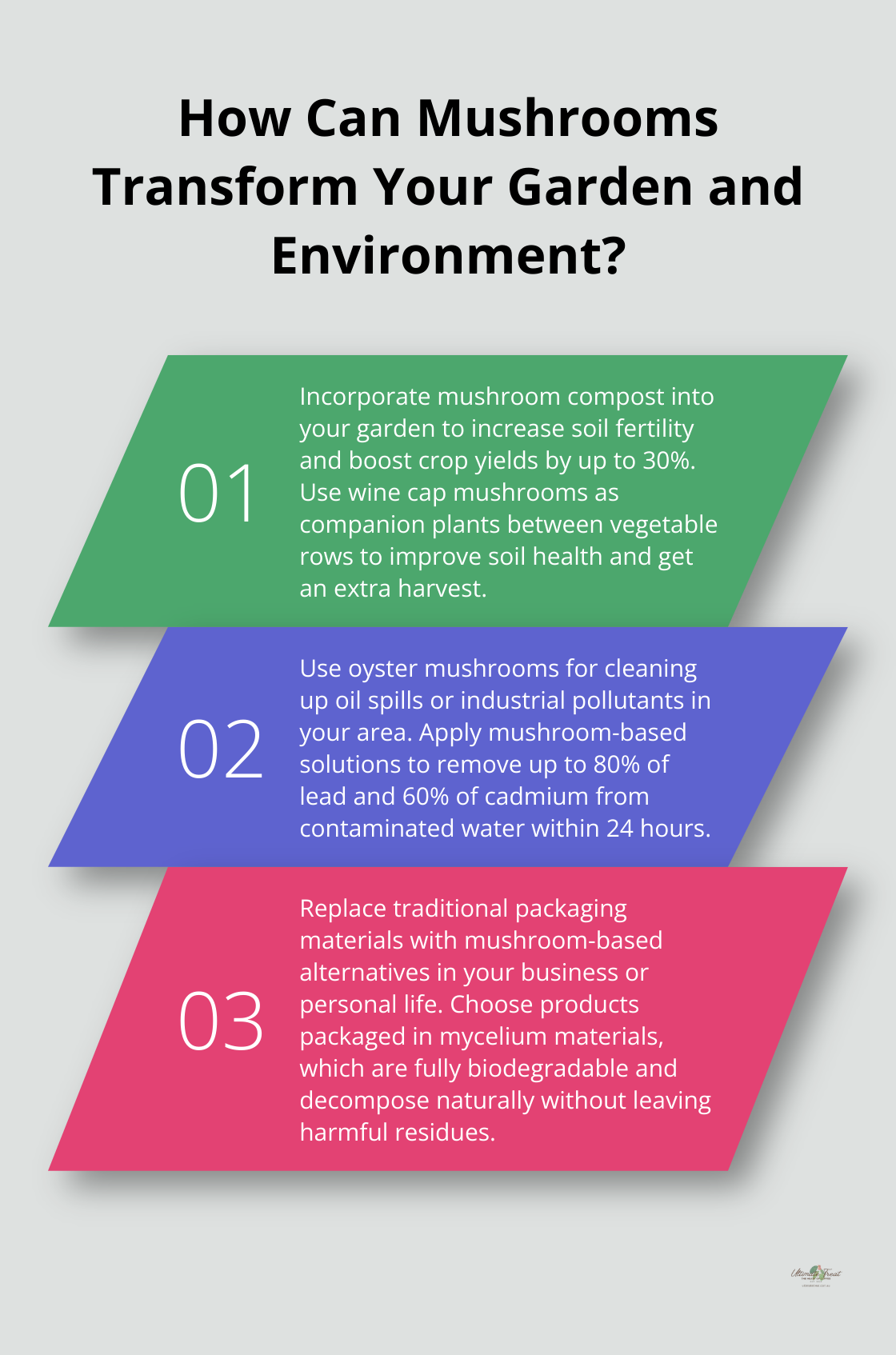
The innovative use of mushroom-based materials in packaging, construction, and fashion industries showcases their potential to replace less sustainable options. Ongoing research continues to uncover new ways these fungi can contribute to environmental conservation and restoration. Protecting fungal biodiversity is essential to maintaining ecological balance and harnessing its full potential in addressing environmental challenges.
At Ultimate Treat, we recognise the importance of mushrooms for their environmental benefits and health-boosting properties. We’ve created a premium organic coffee blend infused with Chaga and Lion’s Mane mushrooms (offering a delicious way to support your health). Mushrooms have much to offer in our quest for a more sustainable and environmentally friendly world.

